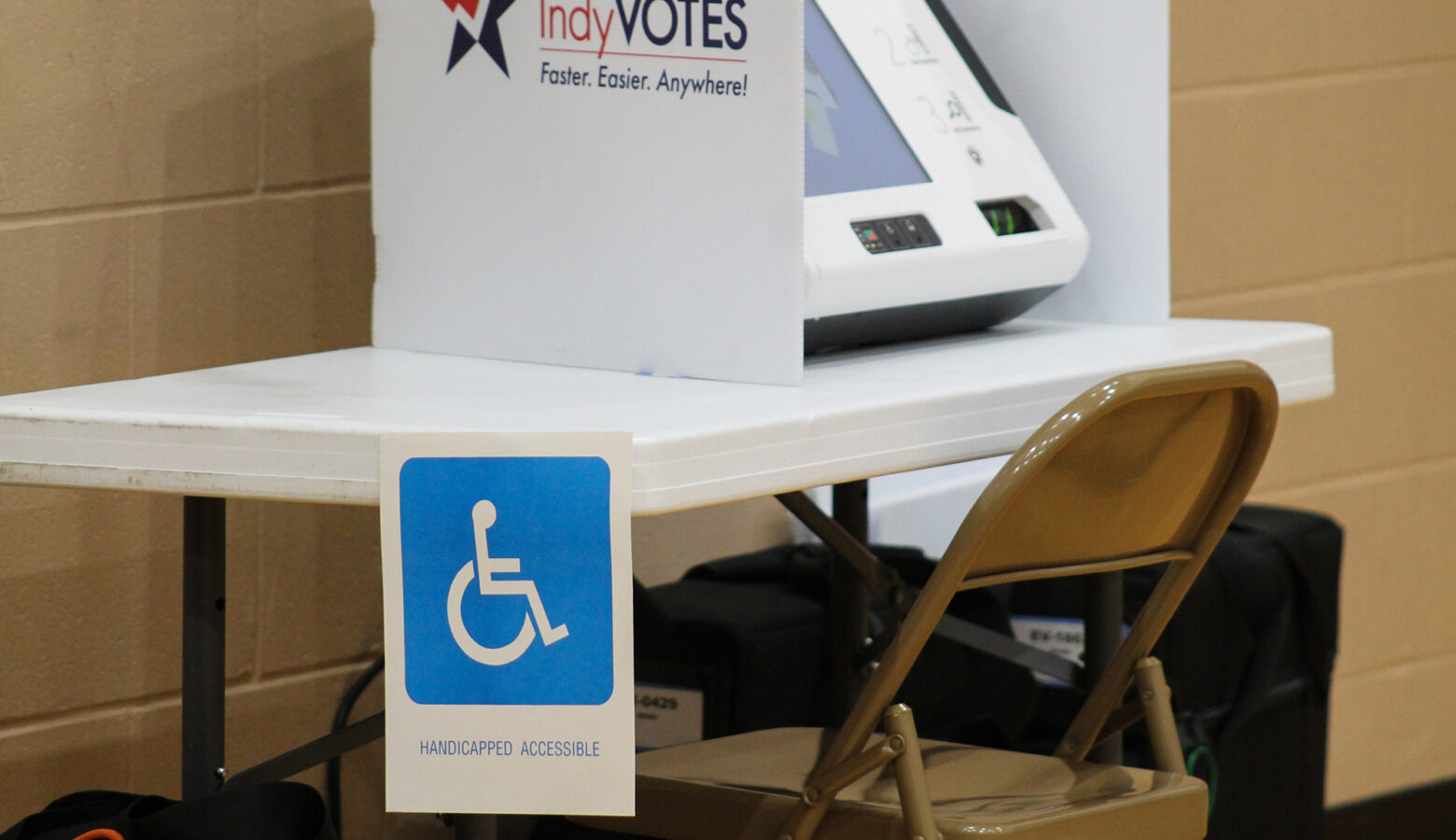How accessible is voting in Indiana? Advocate offers advice for Hoosiers with disabilities

With about two weeks before Election Day, many Hoosiers are creating their voting plans. Advocates say even with federal protections, Hoosiers with disabilities can still encounter a variety of barriers when they cast their ballot.
Voting accommodations are required by federal law. For example, the Americans with Disabilities Act requires polling locations to meet accessibility standards and the Help America Vote Act requires an electronic voting machine at every polling location.
Emily Munson, the policy director for Indiana Disability Rights, said there is usually a solution if people with disabilities encounter problems voting – as long poll workers are willing to work with them.
“If, for some reason, there is a problem, I think voters ought to remember that there are entities out there to help them enforce their rights,” Munson said.
Voters can reach out to the Indiana Disability Rights or secretary of state’s office.
Indiana Secretary of State’s Office
(866)-IN-1-VOTE (866-461-8683)
They’ll have staff on hand for phone calls from 6 a.m. to 7 p.m. Eastern.
Indiana Disability Rights
Voice (317) 722-5555
Toll Free (800) 622-4845
Text Telephone (TTY) (800) 838-1131
Indiana Election Division
Direct (317) 232-3939
Toll Free (800) 622-4941
Munson said voters can also file a grievance at a polling location.
“Unfortunately, taking that route isn’t going to enable the person to actually vote in a timely manner, most likely,” Munson said. “It’s incumbent upon folks with disabilities to, if they do encounter a problem, do what they can to cast their ballot or a provisional ballot or wherever they can, and then follow up afterward once their ballot is cast.”
Voters with disabilities are able to request a mail-in ballot until Thursday, Oct. 24. Hoosiers can apply in-person at their local election administrator’s office by 5 p.m. local time or online at IndianaVoters.com until midnight.
Some Hoosiers qualify to vote by travel board. This option means a bipartisan team will deliver the voter’s ballot and assist the person with completing their ballot during a 19-day period before the election. Hoosiers who qualify to vote by travel board must complete that application no later than noon the day before the election.
“Some need to think about whether you want to apply to your voting portal to vote electronically or whether you would feel more comfortable going to a polling place and bringing someone to assist you, ” Munson said.
READ MORE: What do I need on Election Day? The general election is Nov. 5
Join the conversation and sign up for the Indiana Two-Way. Text “Indiana” to 765-275-1120. Your comments and questions in response to our weekly text help us find the answers you need on statewide issues and the election, including our project Civically, Indiana.
If a voter wants assistance, Munson said they should consider whether they want to bring a trusted person with them or have polling officials act as their assistants.
Munson said accommodations can vary from person to person because disabilities can vary.
“There is a lot of goodwill and good intention ensuring that everyone eligible to vote, including folks with disabilities, can vote,” Munson said. “But sometimes there are barriers that just come up.”
In the last several years, Munson said the Indiana Disability Rights office has done polling place surveys and found most physical accessibility barriers were “relatively minor” and could be worked around. However, there are still some common issues that pop up consistently.
“I would say the most common that we’ve seen is that there is no accessible parking signage. Even if the spots are wide enough for a van with a lift and there is a straight spot for someone to unload, deploy their lift or a ramp and get out in a wheelchair, there just isn’t any sign reserving it for folks with disabilities,” Munson said.
Some polling locations won’t have any accessible parking at all. Munson said in those cases her office will recommend poll workers designate an area of the parking lot to be accessible and block off the spots needed for ramps or lifts using traffic cones.
Munson said another issue they see often is polling locations where the door takes more than five pounds of pressure to open or there’s no way to open the door other than turning the handle.
“In those circumstances, we would recommend that either that to be manned by a poll worker or propped open wide enough that someone in a wheelchair could get through,” Munson said. “Or at the very least that a sign be posted on the door with a phone number of a polling official that someone with a disability could call and request help.”
Munson said there are still a lot of ways the voting process can be more accessible. She said one way is to make the electronic voting process a common option that’s available “rather than a temporary stopgap.”
“The more options voters have to cast a ballot, the more likely they will be able to find a solution that meets their needs to vote efficiently and privately in a comfortable manner,” Munson said.
Munson also emphasized that all people with disabilities have the same voting rights. That includes people under guardianship, and people living in health care institutions, such as nursing, assisted living and state-operated psychiatric facilities.
“They should speak with someone in the administration at their facility and get the assistance that they need to make sure that they have an actionable voting plan,” Munson said.
If individuals encounter issues in those situations, she recommends reaching out to advocates or officials.
Abigail is our health reporter. Contact them at aruhman@wboi.org.

